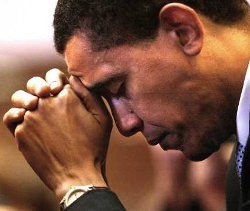From the Archives: Why Vote for the Lesser of Two Evils
(First posted in Dec., 2011)
A recurring question in the American political experience is this: ”Should people of conscience vote for the lesser of two evils?” The question is of interest to all who care about right and wrong but carries special interest for Christians, since their aim is to do all things in obedience to Christ.
My thesis is simple. In a vote between two evils, Christians ought to back the lesser of the two.
For the purposes of this essay, I’m assuming readers already believe Christians ought to vote. My aim is to present three arguments for voting for the candidate who is least evil, whether the office is President of the United States, U.S. Senator or Village Clerk.
1. Such a vote is the lesser of two evils.
The first argument for voting for the lesser of evils is in the proposition itself: less evil. Who can be against that? Here’s the argument one statement at a time:
Discussion
From the Archives: Do the Religious Beliefs of US Presidents Matter?
(Used with permission from Baptist Bulletin July/Aug. 2012. All rights reserved.)
Do the religious beliefs of U.S. presidents matter? Though the question is not new (Baptists, as well as Protestants and evangelicals in general, wrestled with “the Catholic issue” when John F. Kennedy ran for president in 1960; Kennedy spoke to allay their fears), American voters appear to be headed toward a 2012 election with unusual religious features. As of this writing, the top-tier choices include a vaguely “Christian” candidate and an indisputably Mormon candidate. The latter appears certain to become the Republican nominee for president. This development has many taking a fresh—and anxiety-tinged—look at what they believe about separation of church and state.
For conservative Christians, the situation is especially uncomfortable. They believe deeply that President Obama’s political philosophy and policies are harming the country and that he must be defeated, yet they find Mitt Romney’s Mormonism disturbing. After all, though the Mormon religion is suffused with old-fashioned American values, it’s a religious newcomer born entirely by reinventing major components of the Christian faith—and that sort of reinventing is a profoundly “unconservative” thing to do to the religion that built Western civilization.
Discussion
A Parent's Guide to Civic Engagement
Body
“Encourage your children to be active in their community. Consider opportunities like volunteer work, community theatre, and church or school outreach projects.” HEDUA
Discussion
Faith and High Office: Do the Religious Beliefs of US Presidents Matter?
 Posted with permission from Baptist Bulletin July/Aug. 2012. All rights reserved.
Posted with permission from Baptist Bulletin July/Aug. 2012. All rights reserved.
Do the religious beliefs of U.S. presidents matter? Though the question is not new (Baptists, as well as Protestants and evangelicals in general, wrestled with “the Catholic issue” when John F. Kennedy ran for president in 1960; Kennedy spoke to allay their fears), American voters appear to be headed toward a 2012 election with unusual religious features. As of this writing, the top-tier choices include a vaguely “Christian” candidate and an indisputably Mormon candidate. The latter appears certain to become the Republican nominee for president. This development has many taking a fresh—and anxiety-tinged—look at what they believe about separation of church and state.
For conservative Christians, the situation is especially uncomfortable. They believe deeply that President Obama’s political philosophy and policies are harming the country and that he must be defeated, yet they find Mitt Romney’s Mormonism disturbing. After all, though the Mormon religion is suffused with old-fashioned American values, it’s a religious newcomer born entirely by reinventing major components of the Christian faith—and that sort of reinventing is a profoundly “unconservative” thing to do to the religion that built Western civilization.
The situation has exposed confusion about the relationship between faith and high office. Left-leaning news outlets frame stories as though “religion in government” were a novel and dangerous idea. (See cbsnews.com.) But many toward the center and right are apparently confused as well. According to an ABC News-Washington Post poll, 66 percent of Americans believe “political leaders should not rely on their religious beliefs in making policy decisions,” suggesting that, in the minds of many, faith and governance should have no relationship at all. Among conservatives, while some occasionally parrot the “separation of faith and politics” rhetoric of liberal secularists, more than a few tend to overstate the role of faith in government. (Take for example, the ABC News article “Rick Santorum Regrets Saying JFK’s Religion Speech Made Him Want to ‘Throw Up.’” See also “My Take” by R. Albert Mohler Jr. and “A More Accurate Reading.”)
Discussion
Why Vote for the Lesser of Two Evils

I know. It’s the wrong season for thinking about politics. Nonetheless, I’m thinking about it, and sometimes you have to serve up your ideas while they’re still warm.
A perennial (or perhaps biennial or quadrennial) question in the American political experience is “Should people of conscience vote for the lesser of two evils?” The question is of interest to all who care about right and wrong but carries special interest for Christians since their aim is to do all things in obedience to Christ.
My thesis is simple. In a vote between two evils, Christians ought to back the lesser of the two.
For the purposes of this essay, I’m assuming readers already believe Christians ought to vote. My aim is to present three arguments for voting for the candidate who is least evil, whether the office is President of the United States, U.S. Senator or Village Clerk.
1. Such a vote is the lesser of two evils.
The first argument for voting for the lesser of evils is in the proposition itself: less evil. Who can be against that? Here’s the argument one statement at a time:



Discussion